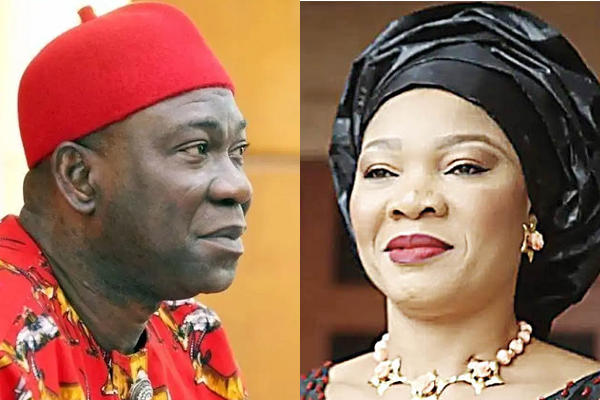Organ Harvesting: Case adjourned as Ekweremadu, wife are taken back to custody
4 min read
Ike Ekweremadu and Beatrice Ekweremadu
The trial of Senator Ekweremadu and his wife for human trafficking continued today in London. The trial was attended by several Nigerian politicians, especially Ekweremadu’s colleagues in the Nigerian Senate, in a remarkable show of solidarity with the Senator of Enugu West.
As expected, the age of the victim, David Ukpo, was never a decisive element of the case. So, even though the court confirmed that David Ukpo is not a minor and is treating him as an adult, it made no difference in the position of the court.
The offense Ekweremadus were accused of committing could be committed regardless of whether the victim is a minor or an adult. So, the apparent emphasis the Ekweremadus placed on the age of the alleged victim appears to have been misplaced. The age status of the victim is more of a moral question rather than a legal one. The key elements of the offense are two: First, the accused must have played a role in planning or funding the travel of the victim from Nigeria to the United kingdom. This element of the offense has been established by Ekweremadu’s own admission. His letter to the British High Commission sponsoring the visa application of Ukpo is a material action toward the travel of Ukpo. Second, the accused must have an intent to exploit the Mr. Ukpo. This is where the issue lies and every major analysis should be focused on that.
It is admitted by all parties agree that Ekweremadu arranged David Ukpo’s trip to London. That is undeniable, given the Senator’s letter requesting for British visa for the yonng man. The burden is now on the Ekweremadu to show that he did not have any intention to exploit David. So, focusing on the exploitation factor, the purpose of taking David to London was to harvest his kidney. Exploitative element will exist if it is found that the Ekweremadus intended to take advantage of Ukpo. That is; whether they took advantage of his poverty, or his lack of education or lack information, or the comparative inequality of negotiating strength, etc
Did the Ekweremadus Take Undue Advantage OF David Ukpo?
The outcomme of this case will most depends depend on how the judge answers this question. So, how do you think the judge will answer this question? The law requires you to take into consideration the total circumstances surrounding the entire transaction – how the parties met, what the parties knew and understood about the whole arrangement, efforts of any of the parties to conceal material facts from the other party or to deny the other party the opportunity of getting professional and material advice in good time. The exploitation factor here is actually very dicey because the law forbids the parties from selling or paying for human body organ. So, the Ekweremadus do not have the ability to say: “We paid the full market rate for kidney”, which would have been an easy way to rule out exploitation, if this transaction were a regular commercial transaction. The fact that you paid the full market price for something you gained or received is an easy way to show that you did not cheat and did not take advantage of anyone. But where there is no commercial value for kidney, where the law forbids selling or buying of kidney, it become harder to prove that you did not take undue advantage.
The ability to bring Ukpo into the UK and decide whether he stays in the UK or returns to Nigeria is an awesome power. The ability to bring several Nigeria Senators to support you in court, while the poor David stands out like an orphan is an important factor. Indeed, if I were advising the Ekweremadus, I would ask them to play down their ability to attracting the open support of powerful Nigerian leaders. Such thing all lead to one conclusion, which is the probability of undue influence at play in any exchange between the Ekweremadus and David Ukpo. It will make it harder for any reasonable person to believe that David Ukpo and the Ekweremadu’s had a fair and balanced negotiation over the donation of his kidney to their daughter.
The Implications of The Continued Detention Without Bail
The fact that the court continues to remand the Ekweremadus in prison could mean many things. For one, it reflects the courts’ view as to the gravity of the offense and the belief in the possibility of the accused interfering with administration of justice if released on bail. It also reflects that the prosecutors’ assessment of the offense has not been lowered even after it is now on record that David is not a minor. If the court thought that the evidence against the Ekweremadus was not strong enough to achieve conviction or that the offense charged were not a grievous one, the court would have been leaning towards bail. But as it is, the court adjourned the case till 4th of August while leaving them in prison till at least that day. By the 4th of August, the husband and wife would have been in prison for more than six weeks. That is unusual length of time in prison awaiting trial in a developed country like Britain. While we respect the fact that there is a trial ongoing and the need to avoid any appearance of preemption of the court, the continued denial of bail is a bad sign.
This report was written by Emeka Ugwuonye, founder of Due Process Advocates

